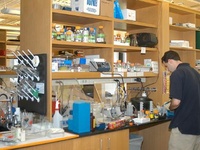By the end of the month, the Provost’s Committee on Biodefense Research and Regulations will be issuing a report that promises Harvard’s first clear, in-depth and extensively discussed stance on research under new national security legislation.
In his public statement in April, Summers said he would set the University on a course of defending academic freedom, hearkening back to the days of the 1950s, the last time Harvard faced such a significant challenge from the government.
“It would be my pledge that the University will, in the future as in the past, uphold the commitment to academic freedom with all the vigor that we can,” Summers said.
But at the height of the Red Scare, while Summers’ predecessors did take strong public stances in defense of academic freedom, their actions did not always match the high ideals that Summers attributes to them.
Cold War Chills
As fear of communism swept the nation during the Cold War, universities across the nation felt the rapid change in political climate.
Many states instituted loyalty oaths for faculty, and Massachusetts lawmakers proposed a new bill calling for the removal of communist teachers.
In 1952, two congressional committees geared up for an investigation into the communist influence on the nation’s campuses—the House Un-American Activities Committee (HUAC), chaired by Rep. Harold Velde, R-Ill., and the Senate Internal Security Subcommittee, chaired by Sen. William Jenner, R-Ind.
With a reputation for liberal-leaning professors, Harvard was often referred to as the Kremlin on the Charles, and it came under special scrutiny from McCarthy and other Red-hunters in Washington.
While Harvard’s leaders would not allow any communist faculty on campus—a virtual impossibility in the tense climate of the 1950s—they did pledge to safeguard the intellectual liberty of the University and supported a tenured professor who came under suspicion.
“The common perception was that Harvard was unusually good in comparison to other universities in terms of protecting academic freedom,” says Julie A. Reuben, a historian of higher education and professor at Harvard’s Graduate School of Education.
In a speech on the eve of Commencement in 1949, University President James Bryant Conant foresaw the challenges that the University would face, and pledged to stand firm.
“As long as I am President of the University, I can assure you there will be no policy of inquiry into the political views of members of the staff and no watching over their activities as private citizens,” Conant said.
“Any suggestion that we should employ here a procedure comparable to that required by the necessities of secret government work and investigate the loyalty of our staff is utterly repugnant to my concept of a university,” he added.
When Jenner and Velde began their investigations into communist influence on college campuses, Conant emphatically denied harboring communists on the faculty, but he also criticized the probes for interfering with universities’ academic freedom.
Read more in News
Pataki: 'Yale is Going to Crush Harvard'













